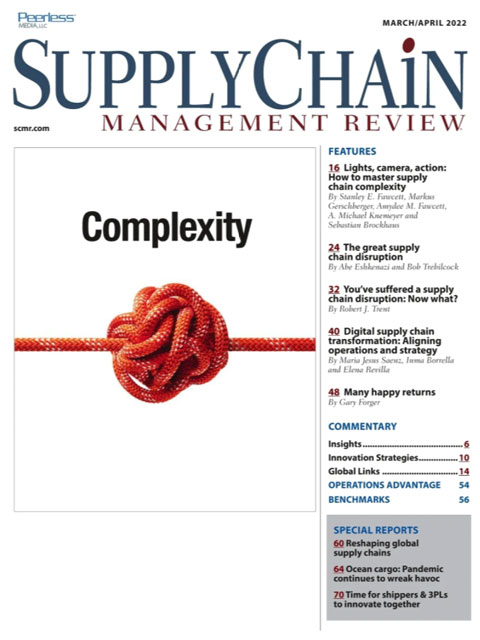Sorry, but your login has failed. Please recheck your login information and resubmit. If your subscription has expired, renew here.
March-April 2022
Yesterday, I hosted a webinar on the steps supply chain leaders are taking to redesign their supply chains to cope with this period of unprecedented demand. Earlier last month, I attended the Manifest conference in Las Vegas. The exhibitors featured a lineup of supply chain startups while the attendee list was dominated by venture capital firms looking to get in on the action in our booming industry. This morning, one of the lead news stories is about another disruption threatening to bring global supply chains to a halt: Browse this issue archive.Need Help? Contact customer service 847-559-7581 More options
This is an extraordinary time for business. Regardless of the industry, or whether a company serves other businesses or sells directly to the consumer, supply chain managers and their teams are operating in an extremely dynamic environment. In addition to meeting customer expectations for high variety, rapid delivery and reasonable costs, supply chains are struggling to keep up with shortages of talent, transportation assets and supply.
Meanwhile, there has been a significant increase in role responsibilities for supply chain professionals at almost every level. Last fall, Abe Eshkenazi, the CEO of the Association for Supply Chain Management, and Bob Trebilcock, the editorial director of Supply Chain Management Review, hosted a live episode of The Rebound * podcast at ASCM Connect 2021, ASCM’s annual conference. They brought together three experienced supply chain executives to explore the issues facing their organizations as our industry rebounds in a post-COVID world. They were: Pat Bower, senior director of supply chain from chemicals supplier Aceto; Marcia Brey, vice president of distribution for GE Appliances; and Chris Pickett, chief strategy officer for Flock Freight.
Abe Eshkenazi: Pat, why don’t you kick things off and tell us what is top of mind for Aceto.
Pat Bower: We make products that range from chemicals to help to make vaccines and medicines work better to chemicals used in cleaning products for standard consumer goods. Regardless of the chemical, there’s been an uptick in demand. Regardless of what consumers are buying, every one of them has a tremendous desire for really timely product availability. The product doesn’t matter. Since the pandemic started, I’ve moved from a consumer goods company to the chemical industry. Consumer behaviors are the same in both. I’m guessing, Marcia, that GE Appliances has seen that too.
Marcia Brey: I think you said it well, Pat. What you saw applies to the appliance industry too. What surprised us the most was just how quickly demand change happened. I’d like to think that we have good forecasting models, but, like many, our forecasts for the future are dependent on the past. All of a sudden, we had to throw it all out the window.
Within six weeks, we went from a make-to-stock business to a make-to-order business because we had drained all of our inventory throughout our network, yet the demand kept coming. Fortunately, we had started to invest in certain areas that helped us, but, in a short period of time, we immediately went into a tactical mode of one-by-one problem-solving. We started asking how do we meet our commitments to our customers? How do we create commitments we can deliver? It all had to change.

This complete article is available to subscribers only.
Log in now for full access or start your PLUS+ subscription for instant access.
SC
MR
Sorry, but your login has failed. Please recheck your login information and resubmit. If your subscription has expired, renew here.
March-April 2022
Yesterday, I hosted a webinar on the steps supply chain leaders are taking to redesign their supply chains to cope with this period of unprecedented demand. Earlier last month, I attended the Manifest conference in… Browse this issue archive. Access your online digital edition. Download a PDF file of the March-April 2022 issue.This is an extraordinary time for business. Regardless of the industry, or whether a company serves other businesses or sells directly to the consumer, supply chain managers and their teams are operating in an extremely dynamic environment. In addition to meeting customer expectations for high variety, rapid delivery and reasonable costs, supply chains are struggling to keep up with shortages of talent, transportation assets and supply.
Meanwhile, there has been a significant increase in role responsibilities for supply chain professionals at almost every level. Last fall, Abe Eshkenazi, the CEO of the Association for Supply Chain Management, and Bob Trebilcock, the editorial director of Supply Chain Management Review, hosted a live episode of The Rebound * podcast at ASCM Connect 2021, ASCM’s annual conference. They brought together three experienced supply chain executives to explore the issues facing their organizations as our industry rebounds in a post-COVID world. They were: Pat Bower, senior director of supply chain from chemicals supplier Aceto; Marcia Brey, vice president of distribution for GE Appliances; and Chris Pickett, chief strategy officer for Flock Freight.
Abe Eshkenazi: Pat, why don’t you kick things off and tell us what is top of mind for Aceto.
Pat Bower: We make products that range from chemicals to help to make vaccines and medicines work better to chemicals used in cleaning products for standard consumer goods. Regardless of the chemical, there’s been an uptick in demand. Regardless of what consumers are buying, every one of them has a tremendous desire for really timely product availability. The product doesn’t matter. Since the pandemic started, I’ve moved from a consumer goods company to the chemical industry. Consumer behaviors are the same in both. I’m guessing, Marcia, that GE Appliances has seen that too.
Marcia Brey: I think you said it well, Pat. What you saw applies to the appliance industry too. What surprised us the most was just how quickly demand change happened. I’d like to think that we have good forecasting models, but, like many, our forecasts for the future are dependent on the past. All of a sudden, we had to throw it all out the window.
Within six weeks, we went from a make-to-stock business to a make-to-order business because we had drained all of our inventory throughout our network, yet the demand kept coming. Fortunately, we had started to invest in certain areas that helped us, but, in a short period of time, we immediately went into a tactical mode of one-by-one problem-solving. We started asking how do we meet our commitments to our customers? How do we create commitments we can deliver? It all had to change.
SC
MR


Latest Supply Chain News
- Survey reveals strategies for addressing supply chain, logistics labor shortages
- Israel, Ukraine aid package to increase pressure on aerospace and defense supply chains
- How CPG brands can deliver on supplier diversity promises
- How S&OP provides the answer to in-demand products
- AI, virtual reality is bringing experiential learning into the modern age
- More News
Latest Podcast

 Explore
Explore
Business Management News
- Survey reveals strategies for addressing supply chain, logistics labor shortages
- How CPG brands can deliver on supplier diversity promises
- How S&OP provides the answer to in-demand products
- AI, virtual reality is bringing experiential learning into the modern age
- Tips for CIOs to overcome technology talent acquisition troubles
- There is still work to do to achieve supply chain stability
- More Business Management
Latest Business Management Resources

Subscribe

Supply Chain Management Review delivers the best industry content.

Editors’ Picks





